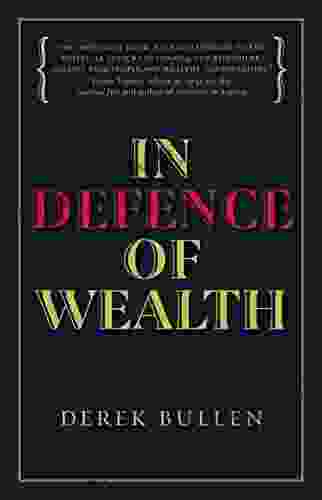A Modest Rebuttal to the Charge That the Rich Are Bad for Society

It has become commonplace to vilify the rich. Politicians, pundits, and activists regularly denounce the wealthy as greedy, selfish, and out of touch. The rich, we are told, are responsible for all of society's ills, from poverty and inequality to climate change and war.
4.8 out of 5
| Language | : | English |
| File size | : | 2043 KB |
| Text-to-Speech | : | Enabled |
| Screen Reader | : | Supported |
| Enhanced typesetting | : | Enabled |
| Word Wise | : | Enabled |
| Print length | : | 123 pages |
| Lending | : | Enabled |
This narrative is not only false, but it is also harmful. It pits the rich against the poor and creates a climate of resentment and division. It also discourages the wealthy from investing in society and helping those in need.
In this essay, we will present a modest rebuttal to the charge that the rich are bad for society. We will show that the wealthy are not only essential to economic growth and prosperity, but they also have a moral obligation to help the less fortunate.
The Economic Benefits of Wealth
The rich are often accused of hoarding their wealth and not contributing to the economy. However, the evidence shows that the wealthy are actually major drivers of economic growth.
The wealthy invest in businesses, which creates jobs and boosts the economy. In the United States, for example, the top 1% of earners account for over 40% of all investment in new businesses. This investment creates millions of jobs and helps to drive economic growth.
The wealthy also create jobs by starting their own businesses. Many of the most successful businesses in the world were founded by wealthy entrepreneurs, such as Bill Gates, Jeff Bezos, and Warren Buffett. These businesses have created millions of jobs and helped to improve the lives of billions of people.
In addition to creating jobs, the wealthy also contribute to economic growth by investing in research and development. The wealthy are responsible for funding many of the new technologies that have improved our lives, such as the internet, the smartphone, and the electric car.
The Moral Obligations of Wealth
The wealthy have a moral obligation to help the less fortunate. This obligation stems from the fact that the wealthy have benefited from the advantages of society, such as education, healthcare, and infrastructure. The wealthy also have a responsibility to give back to the society that has made their success possible.
There are many ways that the wealthy can help the less fortunate. They can donate money to charities, volunteer their time, or invest in businesses that create jobs. The wealthy can also use their influence to advocate for policies that help the poor and disadvantaged.
Some people argue that the wealthy should not be obligated to help the less fortunate. They argue that the wealthy have earned their money and should be free to spend it as they wish. However, we believe that the wealthy have a moral obligation to use their wealth to help others.
The charge that the rich are bad for society is simply not true. The wealthy are essential to economic growth and prosperity, and they have a moral obligation to help the less fortunate. We should not vilify the rich, but rather encourage them to use their wealth to make the world a better place.
4.8 out of 5
| Language | : | English |
| File size | : | 2043 KB |
| Text-to-Speech | : | Enabled |
| Screen Reader | : | Supported |
| Enhanced typesetting | : | Enabled |
| Word Wise | : | Enabled |
| Print length | : | 123 pages |
| Lending | : | Enabled |
Do you want to contribute by writing guest posts on this blog?
Please contact us and send us a resume of previous articles that you have written.
 Book
Book Novel
Novel Page
Page Chapter
Chapter Text
Text Story
Story Genre
Genre Reader
Reader Library
Library Paperback
Paperback E-book
E-book Magazine
Magazine Newspaper
Newspaper Paragraph
Paragraph Sentence
Sentence Bookmark
Bookmark Shelf
Shelf Glossary
Glossary Bibliography
Bibliography Foreword
Foreword Preface
Preface Synopsis
Synopsis Annotation
Annotation Footnote
Footnote Manuscript
Manuscript Scroll
Scroll Codex
Codex Tome
Tome Bestseller
Bestseller Classics
Classics Library card
Library card Narrative
Narrative Biography
Biography Autobiography
Autobiography Memoir
Memoir Reference
Reference Encyclopedia
Encyclopedia Harold Speed
Harold Speed Niki Savva
Niki Savva Aristeidis Bampakos
Aristeidis Bampakos Anna Whitelock
Anna Whitelock Hajime Isayama
Hajime Isayama Matt Fox
Matt Fox Aram Roston
Aram Roston Annette Burns
Annette Burns Anne Sibley O Brien
Anne Sibley O Brien Victoria Bruce
Victoria Bruce Thomas Herold
Thomas Herold Ann Magee
Ann Magee Chad Willardson
Chad Willardson Antoine Rempp
Antoine Rempp Anthony Robbins
Anthony Robbins Sam Kass
Sam Kass Anne Bebbington
Anne Bebbington Isabel Fonseca
Isabel Fonseca Arkady Babchenko
Arkady Babchenko Anthony E Wolf
Anthony E Wolf
Light bulbAdvertise smarter! Our strategic ad space ensures maximum exposure. Reserve your spot today!

 Carson BlairThe Extraordinary Life and Legacy of Yukichi Fukuzawa: A Pioneer of Japan's...
Carson BlairThe Extraordinary Life and Legacy of Yukichi Fukuzawa: A Pioneer of Japan's... Logan CoxFollow ·18.9k
Logan CoxFollow ·18.9k Donald WardFollow ·10.8k
Donald WardFollow ·10.8k Reginald CoxFollow ·15.8k
Reginald CoxFollow ·15.8k Marvin HayesFollow ·9.6k
Marvin HayesFollow ·9.6k Yasunari KawabataFollow ·7.6k
Yasunari KawabataFollow ·7.6k Luke BlairFollow ·12.8k
Luke BlairFollow ·12.8k Jerome PowellFollow ·19.8k
Jerome PowellFollow ·19.8k Allen GinsbergFollow ·17.9k
Allen GinsbergFollow ·17.9k

 Juan Rulfo
Juan RulfoThe Easy Ingredient Ketogenic Diet Cookbook: Your...
Embark on a culinary adventure that...

 Zachary Cox
Zachary CoxDepression Hates a Moving Target: A Groundbreaking...
Depression...

 Colin Richardson
Colin RichardsonUnleash Your Spine-Tingling Curiosity: Dive into the...
In the realm of...

 Evan Hayes
Evan HayesMarketing Fashion Portfolio: The Ultimate Guide to...
In the competitive world of fashion, it is...
4.8 out of 5
| Language | : | English |
| File size | : | 2043 KB |
| Text-to-Speech | : | Enabled |
| Screen Reader | : | Supported |
| Enhanced typesetting | : | Enabled |
| Word Wise | : | Enabled |
| Print length | : | 123 pages |
| Lending | : | Enabled |














